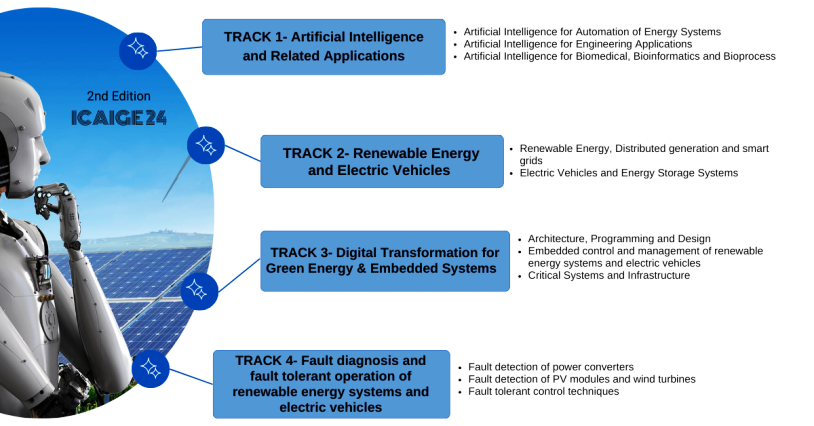The IEEE International Conference on Artificial Intelligence & Green Energy

The IEEE International Conference on Artificial Intelligence & Green Energy (IEEE ICAIGE24) aims to gather researchers, academics, scientists and professionals worldwide to present and discuss their recent results and innovative ideas in the areas of artificial Intelligence and green energy including but not limited to renewable sources and electric vehicles. World-class speakers will be invited to share their experience and disseminate the latest developments, innovations and the future research trends in artificial intelligence applications, renewable energy conversion and management, electric vehicles control, embedded systems design, Fault diagnosis and fault tolerant operation, etc. The conference will be held during the period October 10-12, 2024 in Yasmine Hammamet, Tunisia. Researchers are cordially invited to submit their original contributions through 6-page research papers. Accepted papers will be submitted for inclusion into IEEE Xplore subject to meeting IEEE Xplore’s scope and quality requirements.
IEEE ICAIGE24 is co-sponsored by IEEE (#62696), IES society, IEEE Tunisia Section, IEEE Lebanon Section and IEEE Italy Section. It is organized by the Tunisian Association of Renewable Energy (ATER) and the University of Sousse, Tunisia.
Date and Time
Location
Hosts
Registration
-
 Add Event to Calendar
Add Event to Calendar
- Contact Event Hosts
- Co-sponsored by The IEEE International Conference on Artificial Intelligence & Green Energy
Speakers
PIERLUIGI SIANO
Energy Communities for the Energy Transition
To keep global warming below 2 degrees below pre-industrial levels by the end of this century, and possibly limit it to 1.5 degrees, the 2015 and 2021 United Nations Climate Change Conferences confirmed the commitment to achieve of the so-called Carbon Neutrality (zero emissions) by 2050.
To achieve this goal, the main tool is the energy transition, i.e. the transition from an energy mix centered on fossil fuels to one with low or no carbon emissions, based on renewable sources.
However, it must be considered that, although the energy transition represents an opportunity and offers advantages in terms of environmental impact, some of the interventions associated with it generate additional costs for the community. In order to reduce emissions, in addition to electrifying processes, increasing the use of renewable energy and reducing consumption, it will be also necessary to favour the development of energy communities.
Energy communities, consisting of interactive prosumers, are reaching a dominant interest in many countries in the last few years. Prosumers, by participating in energy communities, can achieve economic benefits, by maximizing the exploitation of locally produced renewable energy and by providing ancillary services to the system operators. Considering the large scale number of prosumers in an energy community and the requirement to carry out both day-ahead and real-time optimizations, new real-time and distributed optimization methods are necessary to cope with the issue of scalability while preserving the privacy of prosumers.
In this keynote, a new extreme-scale and real-time distributed parallel optimization is proposed to manage a large-scale energy community with Peer to Peer (P2P) energy exchanges. The proposed optimization is highly scalable and privacy-preserving. Simulation tests, carried out on a large energy community consisting of thousands of prosumers, demonstrated the effectiveness of the innovative optimization method both in terms of scalability of the method and privacy protection for the prosumers.
Biography:
Professor and Scientific Director of the Smart Grids and Smart Cities Laboratory with the Department of Management & Innovation Systems, University of Salerno, Italy
KHALED GHEDIRA
Keynote 2: ICT social responsibility
This conference aims to make participants travel through the different digital revolutions and their various applications in all areas. It aims essentially to draw their attention to the harmful and perverse effects of digital technology, particularly Artificial Intelligence (AI), on the environment and on society. In order not to slow down the AI based innovation, while preserving the social well-being, various initiatives will be presented: responsible consumption, stakeholders awareness, green ICT, ethics, etc
Biography:
Professor and Scientific Director of the UIK, University Ibn Khaldoun, Tunisia
Keynote 3 : Advanced Power Electronics for Grid-Connectivity Applications
Renewable sources, such as photovoltaic panels and wind generators, and storage devices, like batteries and electric vehicles, are usually connected to the grid for cogeneration. This connection is made through power electronics interfaces that should ensure high stability, voltage regulation, power flow control, and low electromagnetic emission, along with high power density, low cost, and high reliability. To increase the power density, passive devices that are considered the bulkiest components in these systems should be reduced or avoided. This can be achieved by considering multilevel topologies that would comply to power quality requirements without the need of passive filters. In addition, matrix converters are promising structures to connect wind generators to the grid without the use of a bulky DC storage device.
This talk will present a variety of solutions adopted to mitigate power quality issues in distributed power systems, at the generation and charging levels. More specifically, it will present advanced power electronics topologies used for power quality enhancement in the grid. Also, the mathematical modeling of the converters will be addressed on the basis of which control systems are designed. Specific case studies on advanced converters in grid-connectivity or electric vehicle charging applications will be presented and discussed.
Biography:
Full-Professor, Head of the Department of Graduate Studies at "Ecole Supérieure d’Ingénieurs de Beyrouth"

